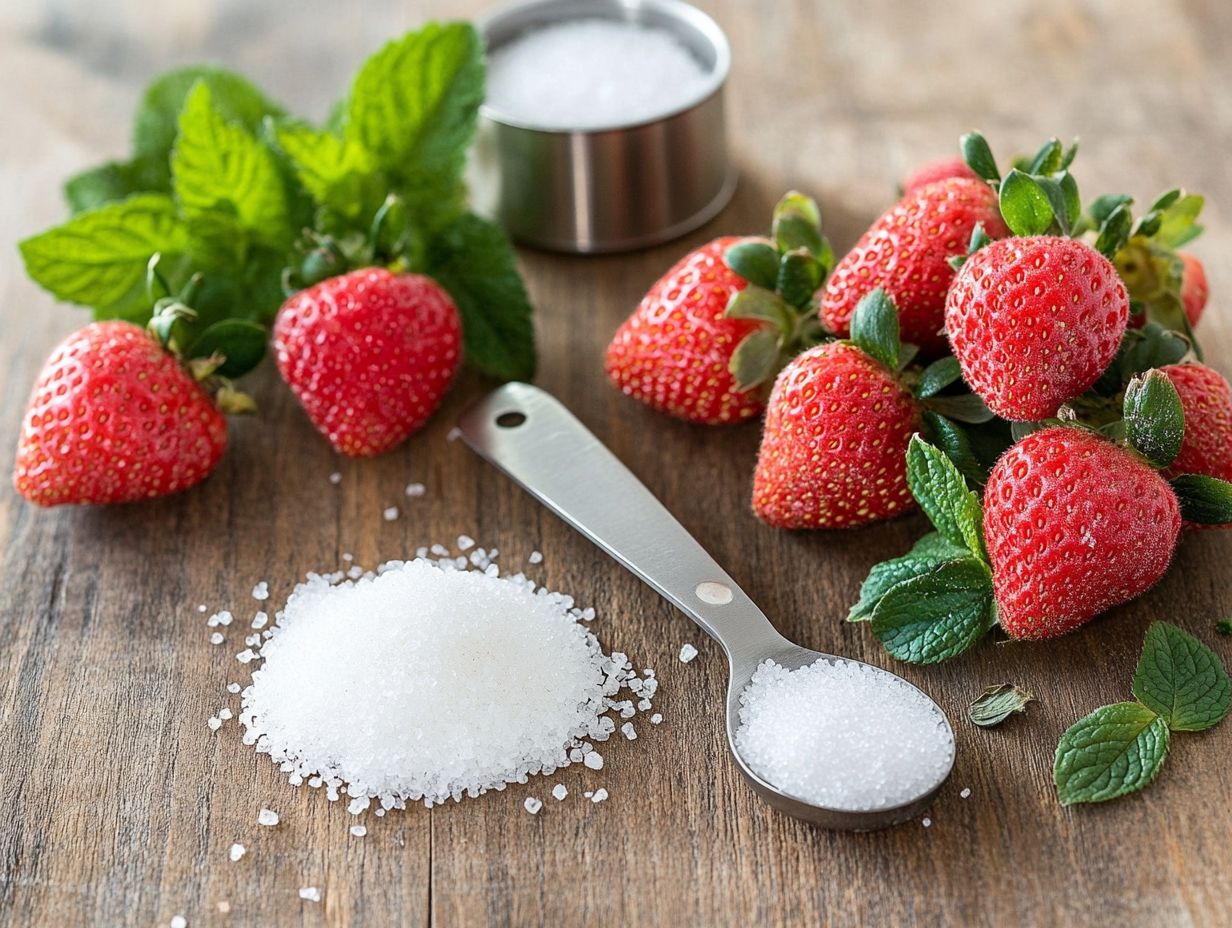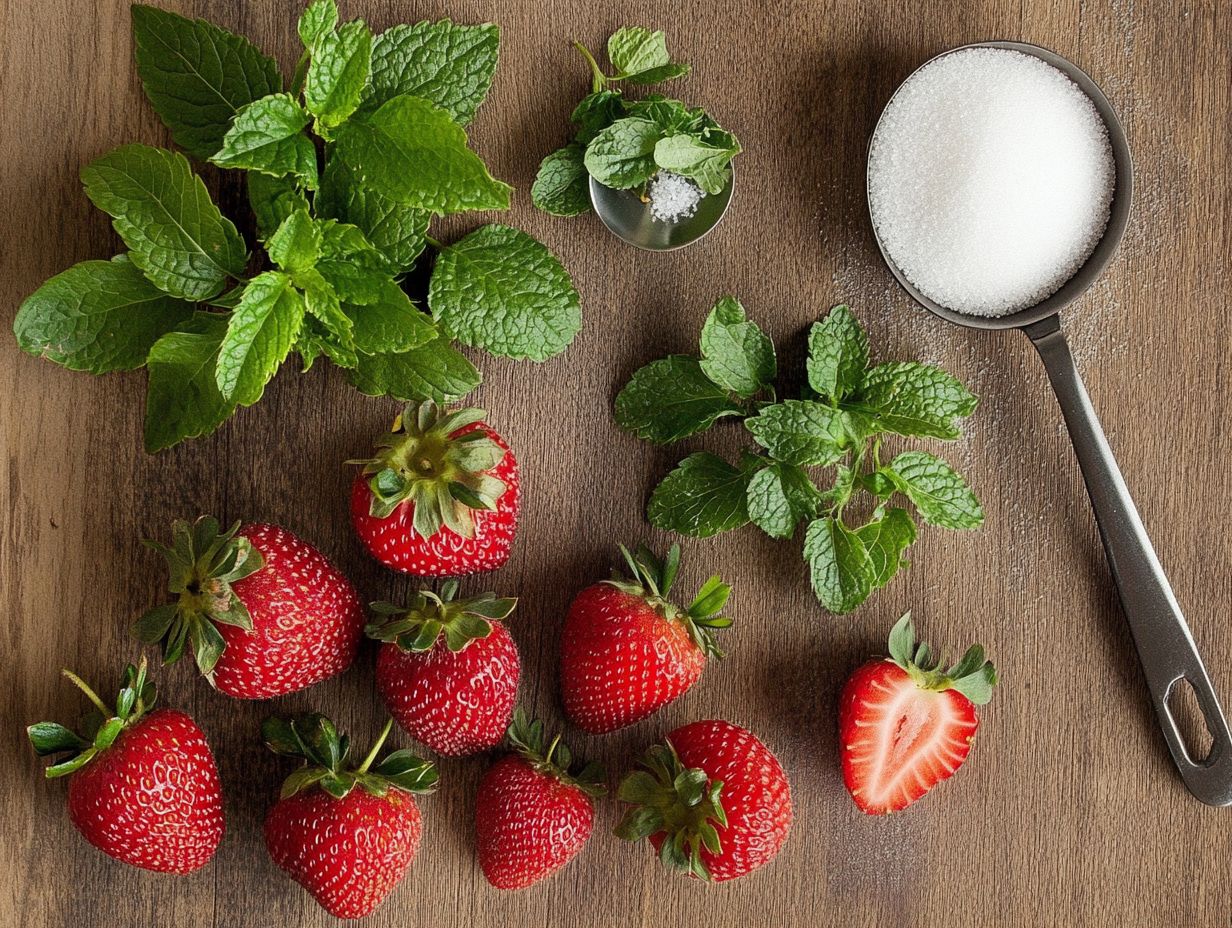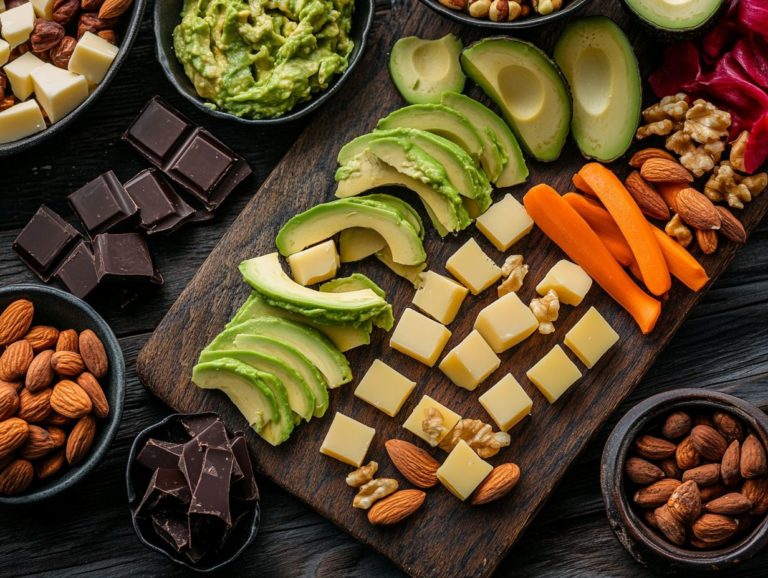What is the Best Keto Sweetener? Common FAQs
Curious about how to indulge your sweet tooth while adhering to a keto diet? Understanding keto sweeteners, including non-caloric sweeteners, is crucial for maintaining a low-carb lifestyle without compromising on flavor. Get ready to indulge your sweet tooth without the carbs! Let s explore how to enjoy sweetness while staying keto!
This article delves into what qualifies a sweetener as keto-friendly, introduces a range of options from natural choices to sugar alcohols and synthetic sweeteners and highlights some of the finest selections available to you. It also addresses potential side effects, such as digestive issues, and provides tips for seamlessly incorporating these sweeteners into your favorite recipes.
Contents
- Key Takeaways:
- What Is a Keto Sweetener?
- What Are the Different Types of Keto Sweeteners?
- 1. Natural Sweeteners
- 2. Artificial Sweeteners
- 3. Sugar Alcohols
- What Are the Best Keto Sweeteners?
- Low-Calorie Sweeteners
- What Are the Side Effects of Keto Sweeteners?
- How Can You Use Keto Sweeteners in Recipes?
- Frequently Asked Questions
Key Takeaways:

- Stevia, monk fruit extract, erythritol, allulose, and xylitol are the top 5 best keto sweeteners due to their low glycemic index and minimal impact on blood sugar levels.
- Keto sweeteners may cause digestive issues, headaches, and blood sugar spikes in some individuals. It’s important to monitor personal tolerance and consumption levels. Understanding the glycemic index of these sweeteners can help you make better dietary choices.
- Keto sweeteners can be used in a variety of recipes, including baked goods, beverages, and sauces, making it easier for individuals to follow a keto diet without sacrificing their sweet tooth.
What Is a Keto Sweetener?
Keto sweeteners serve as alternative sweetening agents, crafted to deliver sweetness without adding to the carbohydrate load commonly associated with traditional sugars. These sweeteners are especially beneficial for individuals adhering to a low-carb diet, as they assist in managing blood sugar and insulin levels while satisfying sweet cravings.
By familiarizing yourself with the different types of keto sweeteners available, you’ll be empowered to make informed dietary choices that support your metabolic health goals, ultimately guiding you toward a healthier lifestyle. Notable options include BochaSweet, Yakon Syrup, and Isomalto-oligosaccharide (IMO), which are emerging in the keto community.
What Makes a Sweetener Keto-Friendly?
A sweetener is deemed keto-friendly if it has little effect on blood sugar and insulin levels, making it an ideal choice for those committed to a low-carb lifestyle. Sweeteners such as erythritol, stevia, and monk fruit are celebrated for their low glycemic index, enabling you to relish sweet flavors without igniting sugar cravings or upsetting your metabolic balance.
Grasping the factors that distinguish keto-friendly sweeteners, such as their impact on insulin levels and potential health risks, is crucial for making enlightened dietary decisions. This principle hinges on the glycemic index, which measures how quickly a carbohydrate raises blood sugar. Sweeteners with a low glycemic index won’t cause significant spikes in blood sugar, thus preserving the delicate metabolic state of ketosis.
By thoughtfully selecting these alternatives, you not only uphold your low-carb regimen but also bolster optimal insulin sensitivity. These dietary decisions are vital, as they significantly impact weight management, inflammation reduction, and overall metabolic health.
Therefore, understanding how to seamlessly incorporate suitable sweeteners can foster a more balanced and sustainable approach to your nutrition.
What Are the Different Types of Keto Sweeteners?
Keto sweeteners can be classified into several categories, including natural sweeteners, artificial sweeteners, and sugar alcohols, each offering its own unique set of advantages and disadvantages.
Natural Sweeteners
Natural sweeteners like stevia, monk fruit, and erythritol are plant-derived and serve as healthier alternatives to sugar, enhancing your meals without the guilt.
Sugar Alcohols
On the other hand, sugar alcohols such as maltitol and xylitol can lead to digestive discomfort for some, so it s wise to tread carefully.
Artificial Sweeteners
Artificial sweeteners think sucralose, aspartame, and acesulfame K are synthetically crafted to deliver low-calorie sweetness, but they might bring along some potential health concerns.
By understanding these categories, you can make more informed dietary choices that align with your health aspirations.
In conclusion, by choosing the right keto sweeteners, you can enjoy your favorite flavors while staying true to your dietary goals. Embrace the sweetness without the carbs, and enjoy your keto journey!
1. Natural Sweeteners
Natural sweeteners from plants are popular among low-carb dieters! They have a minimal impact on blood sugar levels and offer impressive health benefits. Options like stevia, monk fruit, and erythritol serve as excellent alternatives to traditional sugars. They provide sweetness without the calories or metabolic issues tied to high-fructose corn syrup. These natural choices satisfy your sugar cravings while aligning perfectly with dietary goals aimed at enhancing metabolic health.
Stevia, derived from the leaves of the Stevia rebaudiana plant, is known for its remarkable sweetness approximately 50 to 300 times sweeter than sugar. This means you only need a pinch to elevate your recipes! Monk fruit, extracted from the monk fruit melon, brings a unique flavor and is often blended with other sweeteners to enhance taste while remaining calorie-free. Erythritol, a sugar alcohol found in various fruits, is versatile and can be used cup-for-cup in baking, making it convenient for those transitioning away from traditional sugars.
These sweeteners cater to individuals with specific dietary restrictions and play a key role in stabilizing blood sugar and insulin levels. They are ideal for diabetics and health-conscious individuals who want to maintain their well-being without compromising on flavor. Regulatory bodies like the FDA evaluate and approve these sweeteners for public consumption, ensuring safety.
2. Artificial Sweeteners
Artificial sweeteners offer a tantalizing sugar-like taste without the calorie burden. However, they raise concerns about potential health risks and their long-term effects on metabolic health. Popular choices like sucralose, aspartame, acesulfame K, and saccharin are staples in many food products and beverages. Their synthetic origins lead to questions about safety compared to more natural alternatives. Understanding the implications of using these artificial sweeteners is vital for anyone navigating dietary choices.
Some sweeteners are much sweeter than regular sugar, providing a zero-calorie option for those aiming to cut back on sugar or manage their weight. However, they can also cause discomfort, leading to side effects like headaches or gastrointestinal issues for some individuals. Acceptance and use vary significantly in regions like South America and Japan.
On the other hand, natural sweeteners like honey and maple syrup offer nutritional benefits despite being calorie-dense. They don t carry the potential downsides associated with synthetic sweeteners. As health consciousness rises, it s increasingly important to scrutinize the sweetness levels and calorie counts of these options, along with their broader health implications for consumers like you!
3. Sugar Alcohols

Sugar alcohols like erythritol, maltitol, and xylitol are staples in keto-friendly products due to their lower calorie counts and minimal impact on blood sugar levels! They serve as excellent alternatives to sugar, but some individuals may experience digestive issues when consuming them, especially in larger amounts. Understanding the properties and effects of sugar alcohols is crucial for maintaining a low-carb diet while managing sugar intake.
These compounds can effectively satisfy your sweet cravings. They replace traditional sugars in various recipes without significant changes to flavor or texture. However, the sweetness and taste can vary among different types of sugar alcohols, so a little experimentation might be necessary to achieve your desired results.
While sugar alcohols generally don t spike blood sugar levels, consuming them in excess could lead to gastrointestinal discomfort, such as gas or bloating, for some people. Moderation is key to enjoying their benefits while avoiding unpleasant side effects. Additionally, individuals strictly adhering to a ketogenic diet should monitor their impact on ketosis.
What Are the Best Keto Sweeteners?
When considering the best keto sweeteners, options such as stevia, monk fruit extract, erythritol, allulose, and xylitol truly shine. They deliver delightful sweetness without derailing your low-carb lifestyle. Renowned websites like Diet Doctor often recommend these sweeteners for those following ketogenic diets.
Stevia and monk fruit extract are particularly noteworthy for their natural origins and zero-calorie content, making them ideal choices for health-conscious individuals. Erythritol and allulose mimic the taste and texture of sugar while exerting minimal impact on your blood sugar levels.
Although xylitol has slightly more carbohydrates, it remains a favored option due to its dental health advantages, proving to be a versatile alternative for anyone aiming to cut down on sugar.
1. Stevia
Stevia, a natural sweetener derived from the leaves of the Stevia plant, is your go-to for achieving that perfect sweetness without the calories. It’s not just about satisfying your sugar cravings; this plant-based alternative also offers possible health advantages, like supporting a healthy metabolism and helping to maintain stable blood sugar levels.
Incorporating stevia into your recipes or beverages allows you to relish the sweetness without the calories and health risks typically associated with traditional sugars. Stevia is widely used in South America and Japan, where its benefits are well recognized.
Originating from South America, stevia has been cherished by indigenous tribes for centuries as a way to sweeten their foods and drinks. With a sweetness potency that ranges from 50 to 300 times greater than sugar, just a small pinch can transform your dish or drink. This makes it especially appealing if you’re aiming to cut back on sugar intake and fructose.
The possibilities with stevia in the kitchen are endless. Whether you sprinkle it into your morning coffee, blend it into smoothies, or use it in your baking, it seamlessly fits into your culinary repertoire. Plus, since stevia is heat-stable, it s perfect for muffins, cakes, and sauces, allowing you to explore versatile recipes that align perfectly with your healthier lifestyle and dietary choices.
2. Monk Fruit Extract
Monk fruit extract, sourced from the monk fruit (Siraitia grosvenorii), is a natural sweetener that deserves your attention. With its remarkable sweetness and zero-calorie profile, it s an ideal companion for your low-carb lifestyle. Not only is it derived from nature, but it also contains antioxidants, which may enhance your overall health and support a healthy metabolism.
By opting for monk fruit extract as a sugar substitute, you can savor sweet flavors while staying true to your dietary goals, all without jeopardizing your insulin levels.
It’s impressive to know that this sweetener is estimated to be about 150-200 times sweeter than regular sugar, meaning you only need a tiny amount to achieve the perfect flavor. Its exceptional sweetness, along with potential anti-inflammatory properties, positions monk fruit extract as a standout alternative to traditional sweeteners like cane sugar, high-fructose corn syrup, and other sugar alcohols.
If you re eager to incorporate this delightful sweetener into your culinary creations, you ll find it shines in smoothies, baking recipes, and homemade beverages. When you compare monk fruit extract to stevia or artificial sweeteners, you ll likely discover its taste is more pleasant and less bitter making it a compelling choice for those of you who are health-conscious and looking for a satisfying sweetness.
In conclusion, exploring these keto sweeteners can significantly enhance your low-carb lifestyle. Consider trying stevia or monk fruit extract in your daily meals or baking projects. You might be surprised at how delicious and satisfying these natural alternatives can be!
Low-Calorie Sweeteners
3. Erythritol
Erythritol is a beloved sugar alcohol known for its low-calorie content and minimal impact on blood sugar levels. This makes it an exceptional option for anyone on a low-carb diet.
With a sweetness level that s about 70% that of sugar, erythritol offers a delightful taste experience. Most people easily tolerate it, causing fewer digestive issues than many other sugar alcohols.
Incorporating erythritol into your recipes allows you to enjoy sweetness without the unwanted calories and blood sugar spikes associated with traditional sweeteners.
With only about 0.24 calories per gram, erythritol is significantly lower in calories than sugar. This makes it perfect for those looking to cut down on caloric intake without sacrificing sweetness.
You can use erythritol in various cooking and baking applications, from cakes and cookies to beverages. It mimics the properties of sugar, contributing bulk and texture to your favorite dishes.
Its unique properties let it mix perfectly with other sweeteners, enhancing your favorite flavors while keeping the health profile intact. Ultimately, this versatile ingredient supports your journey toward healthier lifestyle choices without compromising on taste.
4. Allulose
Allulose is a low-calorie sweetener that has captivated many for its remarkable ability to replicate the taste and texture of sugar. This makes it an ideal choice for anyone on a low-carb diet.
With just 0.4 calories per gram and a minimal effect on blood sugar levels, allulose offers sweetness without guilt. It satisfies your cravings without derailing your dietary goals.
You can incorporate this sweetener into a wide range of recipes, from baked goods to refreshing beverages. Enjoy your favorite treats without the health risks associated with traditional sugars.
Allulose is more than just a low-calorie alternative; it shines with impressive versatility in the kitchen. Substitute it for sugar in recipes for cookies, cakes, and even sauces, achieving the same level of sweetness without the extra calories.
Adding allulose to smoothies or iced teas elevates the flavor without the added sugars that often lead to weight gain and various health concerns. Unlike some artificial sweeteners, allulose won t leave you with a bitter aftertaste, ensuring an enjoyable dining experience.
This sweetener is a fantastic option for anyone striving to maintain a balanced diet while still indulging in delightful flavors.
5. Xylitol

Xylitol is a sugar alcohol celebrated for its dental health benefits. It stands out as a favored sweetener for those following a low-carb diet, thanks to its lower glycemic index (a measure of how foods affect blood sugar levels) compared to regular sugar.
While xylitol does contain calories, it exerts a milder effect on blood sugar levels. This makes it an excellent alternative for sweetening your favorite foods and beverages.
Its unique characteristics significantly contribute to oral health by helping to reduce the presence of cavity-causing bacteria. This means you get more than just a sweet taste.
Incorporating xylitol into your routine can actively promote the remineralization of tooth enamel, enhancing your defenses against decay. This makes it a remarkable choice for anyone committed to preserving their dental health while keeping an eye on carbohydrate intake and sugar cravings.
You ll find that xylitol can be effortlessly integrated into various recipes, from baked goods to beverages. It fits seamlessly into your low-carb lifestyle without compromising flavor.
Its refreshing sweetness can elevate the taste of your meals, ensuring that you enjoy every bite while reaping the benefits of its modest calorie count and dental advantages. Xylitol also pairs well with non-caloric sweeteners, providing versatility in your dietary choices.
What Are the Side Effects of Keto Sweeteners?
Keto sweeteners offer a sugar-free alternative for those embracing low-carb diets. However, be aware of the potential side effects that may come along for the ride. You might experience common issues like digestive discomfort, including bloating or gas. This is especially true with sugar alcohols, such as erythritol and xylitol, which can trigger digestive troubles for some.
Certain sweeteners may also lead to headaches or blood sugar spikes in sensitive individuals. It’s important to understand these potential risks and closely monitor your body’s reactions as you introduce these sweeteners into your diet.
1. Digestive Issues and Keto Sweeteners
Digestive issues are among the most frequently reported side effects when consuming sugar alcohols like erythritol and xylitol. This is especially true if you tend to go overboard. These sugar alcohols can lead to bloating, gas, and even diarrhea in those who are sensitive, as they aren t fully absorbed in your digestive tract.
Understanding your individual tolerance levels is crucial for incorporating these sweeteners into your diet without facing unpleasant consequences. Not everyone reacts the same way to sugar alcohols; some may tolerate them quite well while others could experience significant digestive discomfort even with just a small amount.
For instance, sorbitol and maltitol are notorious for causing digestive distress, often leading to cramping and increased bowel movements in certain individuals. To minimize these effects, moderation is key. Starting with small servings can help you assess your personal tolerance.
If you’re looking to avoid complications, consider sweeteners that are less likely to cause issues, such as stevia or monk fruit, especially if you have a sensitive digestive system. Always take into account your gut health and dietary habits when selecting alternatives to sugar.
2. Headaches
Some individuals report experiencing headaches as a side effect of consuming certain keto sweeteners, particularly artificial ones like aspartame and sucralose. While these sweeteners are popular for their zero-calorie appeal, they may provoke adverse reactions in sensitive individuals. Pay close attention to any discomfort that arises after consumption.
Understanding the potential for headaches can help you select the right sweeteners that suit your dietary preferences. Research indicates that the occurrence of headaches associated with artificial sweeteners may vary based on individual tolerance levels and the specific types of sweeteners used.
Aspartame, in particular, has frequently been cited as a common trigger, while options like stevia and erythritol seem to have a lower correlation with headaches. If you experience discomfort after consuming these sweeteners, it might be helpful to keep a food diary to pinpoint patterns and potential triggers.
Gradually introducing sweeteners into your diet by starting with smaller amounts can also assist you in assessing your tolerance more effectively. Consider consulting sources like Diet Doctor for additional guidance on managing dietary changes.
3. Blood Sugar Spikes and Insulin Levels
Many keto sweeteners are crafted to minimize blood sugar spikes; however, you might still experience fluctuations due to how your body responds to sugar. Sweeteners with higher glycemic indices, like maltitol and xylitol, can lead to increases in blood sugar, resulting in insulin level spikes. This could undermine the advantages of a low-carb diet.
Being aware of how different sweeteners affect your blood sugar levels and understanding the health risks is crucial for making informed dietary choices. Consider alternatives such as erythritol, stevia, or monk fruit, which generally have a lower impact on glycemic levels.
Even these options can provoke varied responses in different individuals. It’s important to closely monitor your blood glucose reactions and sugar cravings after consumption. Keeping a log of the sweetener types you use and your corresponding blood sugar readings can help you identify any problematic ingredients.
By understanding your personal metabolic responses and adjusting your sweetener choices accordingly, you can enhance your overall keto experience, improve your metabolic health, and maintain stable blood sugar levels.
Have you tried different keto sweeteners? Share your experiences and let us know which ones worked best for you!
How Can You Use Keto Sweeteners in Recipes?
Are you ready to transform your baking with keto sweeteners? Keto sweeteners, including sugar alcohols and non-caloric sweeteners, can be easily integrated into a variety of recipes. They provide a delicious way to satisfy your sweet cravings while adhering to a low-carb lifestyle.
Whether you’re crafting baked goods, sweetening your favorite drinks, or enhancing sauces and marinades, these sugar substitutes open up a world of culinary possibilities. Enjoy all this without the unwanted calories or sugar spikes that typically come with traditional sweeteners like high-fructose corn syrup.
Using keto sweeteners effectively enhances flavor and supports your dietary goals. This aligns well with standard dietary guidelines, emphasizing the benefits of natural sweeteners over synthetic options.
To achieve optimal results, familiarize yourself with the conversion ratios of the various sweeteners. Some may require more or less than regular sugar, and knowing these nuances can make all the difference. For example, erythritol typically converts at a 1:1 ratio with sugar, while stevia packs a punch of sweetness, often needing just a tiny sprinkle. You may also encounter unique sweeteners like allulose and BochaSweet, each requiring distinct adjustments.
When you incorporate these sweeteners into baked goods, consider pairing them with ingredients like almond flour, coconut flour, or a type of low-calorie sweetener known as isomalto-oligosaccharide (IMO) to achieve that perfect texture.
In beverages, whether you’re sipping something warm or cold, even a small amount can work wonders, transforming flavors without overwhelming your drink. Keto-friendly options like yakon syrup can also be used for a natural touch. When it comes to sauces, using sweeteners can elegantly balance acidity, creating a harmonious dish that never compromises on flavor.
Frequently Asked Questions

What is the Best Keto Sweetener?
The best keto sweetener is one that is low in carbohydrates and does not raise blood sugar levels. Commonly used keto sweeteners include stevia, erythritol, monk fruit extract, and other natural sweeteners. Synthetic options like sucralose and aspartame can also be used in moderation.
Is Stevia a Good Keto Sweetener Option?
Yes, stevia is a great keto sweetener option. It is a natural sweetener derived from the stevia plant, commonly found in South America, and has zero calories and zero carbohydrates. It does not raise blood sugar levels and has a low glycemic index.
Can I Use Honey as a Keto Sweetener?
No, honey is not a suitable keto sweetener as it is high in carbohydrates and will raise blood sugar levels. Honey contains high amounts of fructose and has a high glycemic index, making it unsuitable for those following a keto diet.
What is the Difference Between Erythritol and Xylitol?
Erythritol and xylitol are both sweeteners commonly used in keto diets. However, erythritol has zero calories and does not raise blood sugar levels, while xylitol has a small number of calories and a slight impact on blood sugar levels. Erythritol is the preferred sweetener for the keto diet. For those who are particular about their choices, FDA approval can also be a factor in selecting these sweeteners.
Can I Use Artificial Sweeteners on a Keto Diet?
Yes, some artificial sweeteners such as sucralose, acesulfame K, and aspartame can be used on a keto diet. However, it is important to note that these sweeteners may still have an impact on insulin levels and should be used in moderation. Be cautious of synthetic sweeteners as they can sometimes cause digestive issues.
What is the Best Way to Use Keto Sweeteners?
The best way to use keto sweeteners is to use them in moderation and to be mindful of their impact on your blood sugar levels. It is also important to choose natural sweeteners and avoid those with added sugars or artificial ingredients. High-fructose corn syrup and other artificial additives should be avoided. Remember, keto sweeteners should be used as a substitute for sugar, not as a replacement for healthy, whole foods.
For further resources, consider exploring related articles about keto sweeteners to deepen your understanding. We encourage you to try out these recipes and share your experiences with keto sweeteners in the comments!






